
The $7.50 crustacean. Twenty-fiveyears after the premiere of the TV show The Six Million Dollar Man, scientists at the University of California have created a $7.50 lobster. More precisely, they connected $7.50 worth of Radio Shack parts to a California spiny lobster's abdominal neurons, spent 18 months figuring out what the neuronal signal pattern was, and then eventually snipped out the neurons. This left just the lobster and the RatShack box, which correctly replicated the function of the missing nerve cells. This experiment can lead the way to the development of artificial neurons that can allow quadriplegics like Christopher Reeve to enjoy a nice seafood dinner. The scientists celebrated by replacing the electronic neuron with a nutcracker and a small saucer of melted butter.
And it doesn't stain, either. Think of all that time you've wasted downloading porn and splooging on your monitor, when you could have been inventing a high-tech security device. A British company called SmartWater Ltd. has developed a way to anoint your valuables with a fluid containing specially created strands of digital DNA. The DNA acts like a nano-barcode, uniquely identifying high-priced heirlooms and family jewels as yours. The DNA tag is virtually impossible to wash off, and can be detected by the forensic laboratory of any medium-to-large police force. Purchase of a bottle of SmartWater gets you a three-year enrollment in the company's database for your particular DNA sequence.
Quit bugging me. The New Yorker said yes. The CIA said maybe. The Centers for Disease Control and Prevention said no. The public said they didn't care. At stake was the possibility that the recent mutant encephalitis outbreak in New York City was an example of bioterrorism. Last week's New Yorker magazine carried a report, allegedly from Saddam Hussein's body double (employed, no doubt, for the naked butt scenes the Mustache himself won't do), stating that the Iraqi leader had been working on a bioweapon based on West Nile Encephalitis. Since WNE is spread by mosquito and requires an intermediate host, using this particular virus to start a human plague is about as smart as invading Kuwait and not continuing into Saudi Arabia. The CIA was examining the possibility, but had found no evidence of bioterrorism so far. The CDC said that the outbreak was most likely a natural viral adaptation, just "Mother Nature at work." As retribution, look for a vindictive Mayor Giuliani to revoke Mother Nature's lease on the city in the coming days.
Measuring up to the Russkies. September's crash of the Mars Climate Orbiter was caused by human stupidity -- one group of NASA engineers used English values (pounds, feet) and another group used metric values (grams, meters). They forgot to convert their numbers, and now there's a new crater on Mars. The loss of an unmanned spacecraft isn't very tragic, but what about the practical joke called the International Space Station? The Russian/ European half of ISS is built to metric standards, and the American half is built in feet and inches. Reports are that measurement incongruities are partly responsible for the station's immense delays. It may be that the most coveted piece of equipment on ISS will be a Sears Pocket Socket wrench.
Big bang beat. The Relativistic Heavy Ion Collider at Brookhaven National Laboratory was officially dedicated on October 4. When fully operational, the RHIC will smash gold atoms at nearly the speed of light, in an attempt to duplicate conditions that existed at a few milliseconds after the Big Bang. Recreating the Big Bang on Long Island has caused some concern among the millionaires in the nearby Hamptons, but a Department of Energy report states that the chance of any undue relativistic effects (such as creating black holes out of the Earth or permanently warping the structure of space throughout the entire known universe at the speed of light) are minimal. Oh, good.
Patrick Di Justo expects other people to be interested in the minutiae of his daily life.
